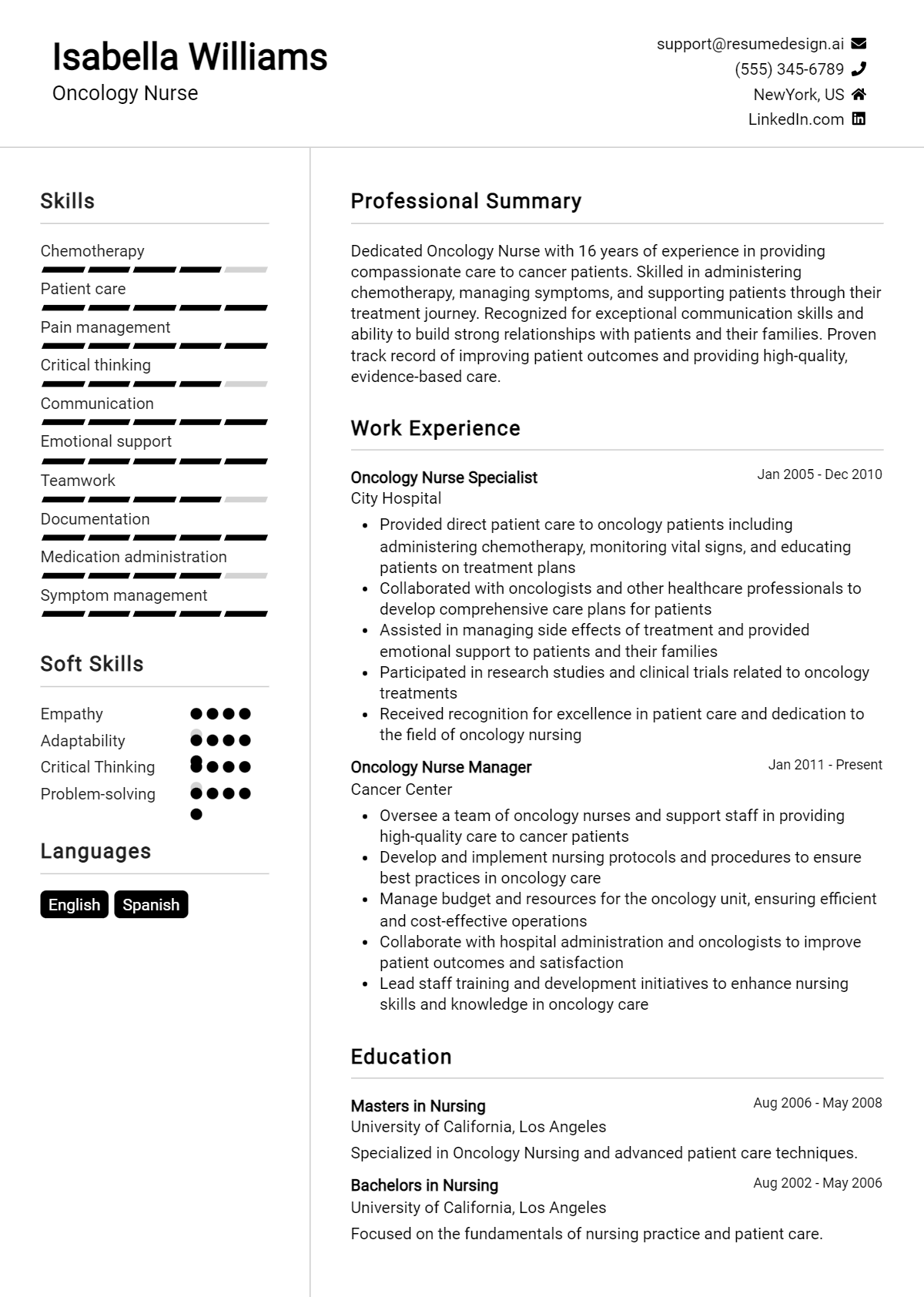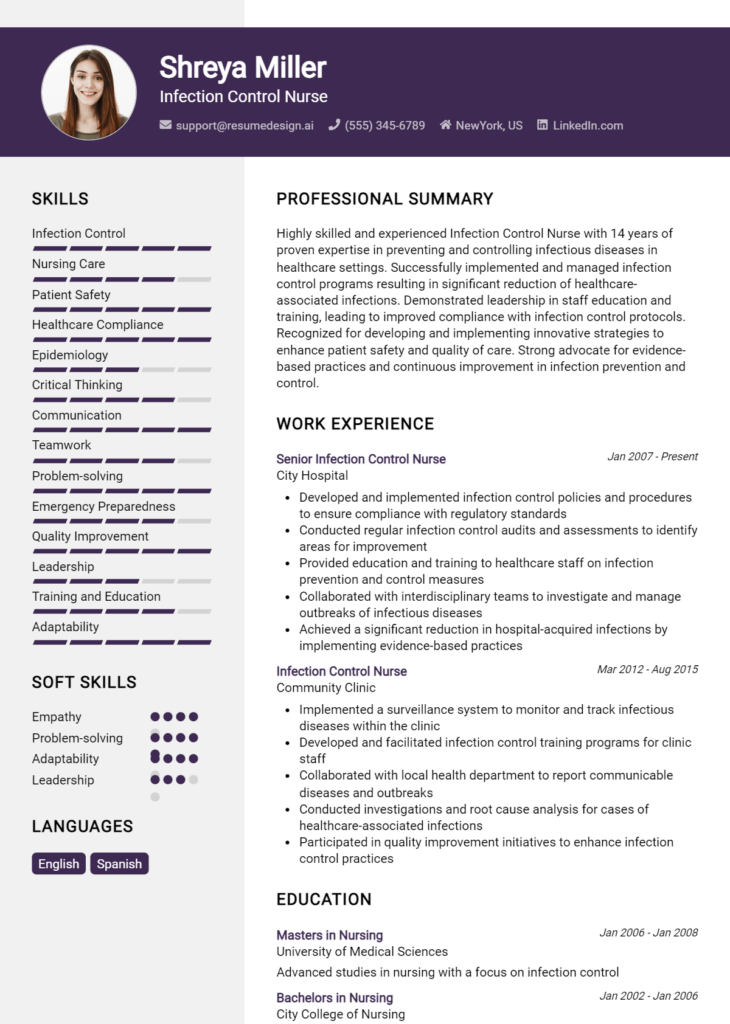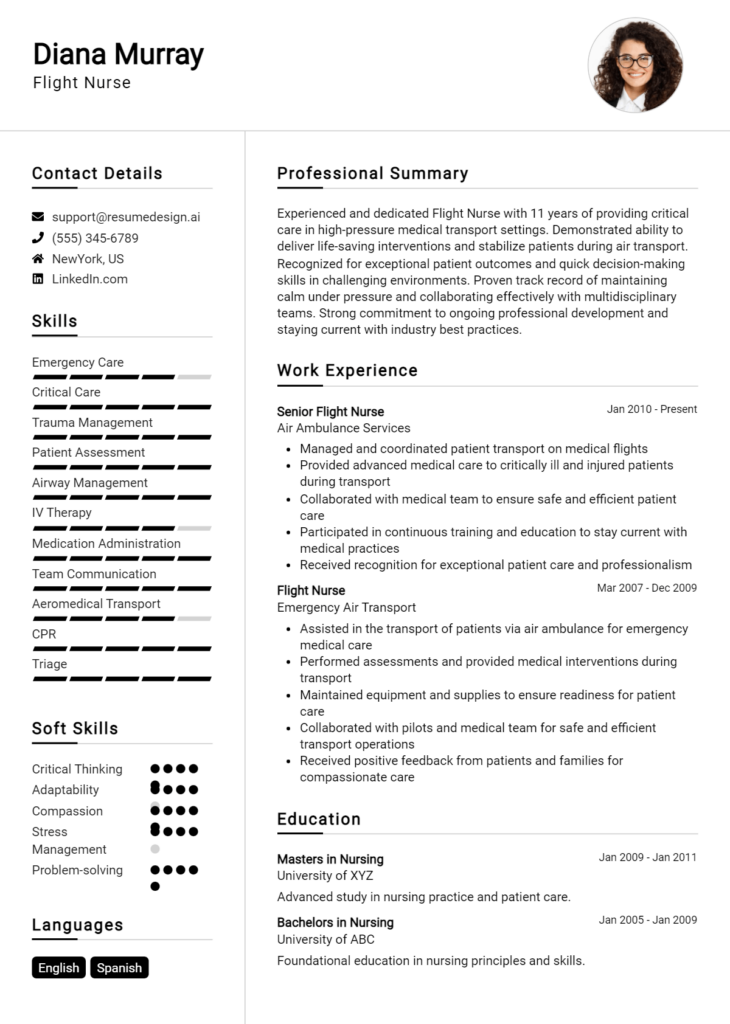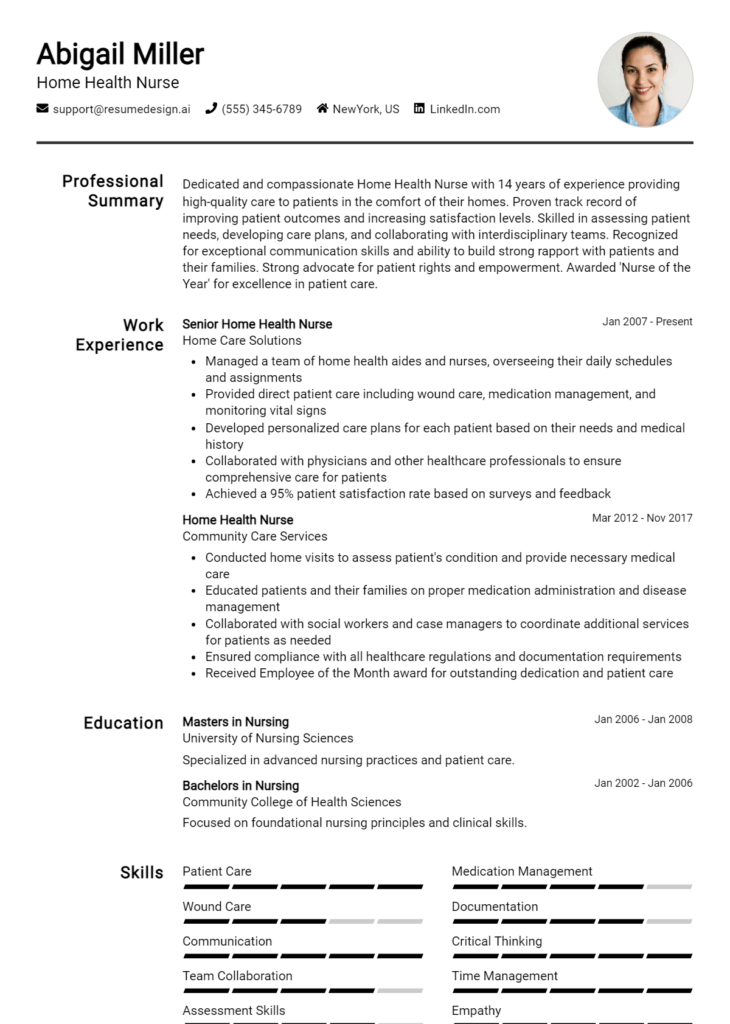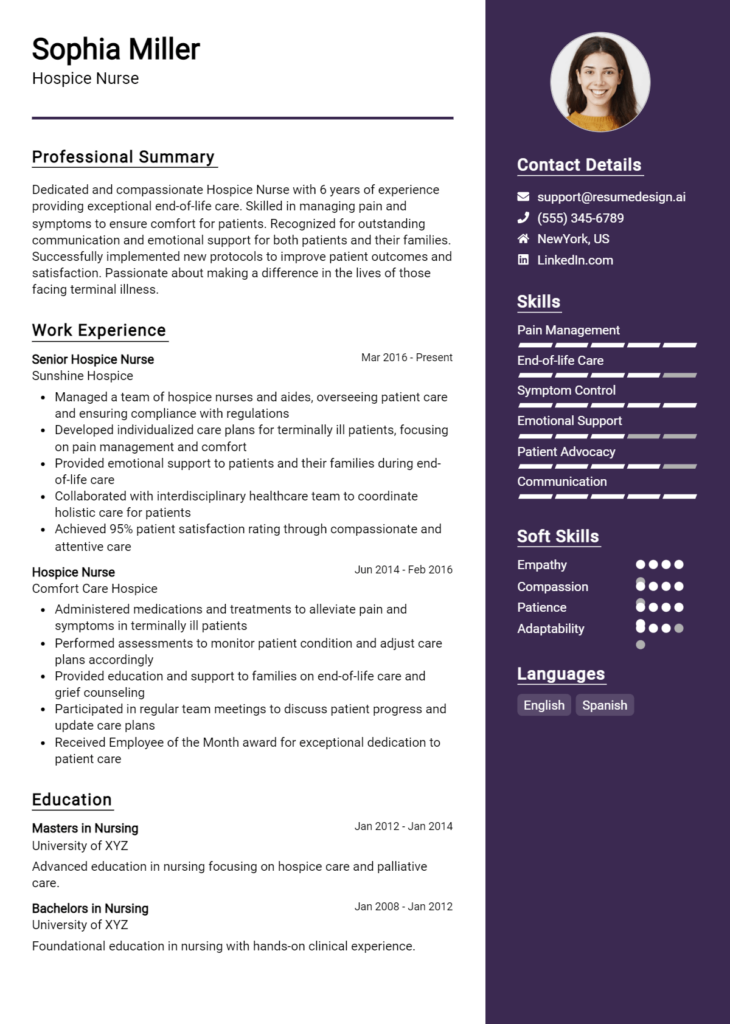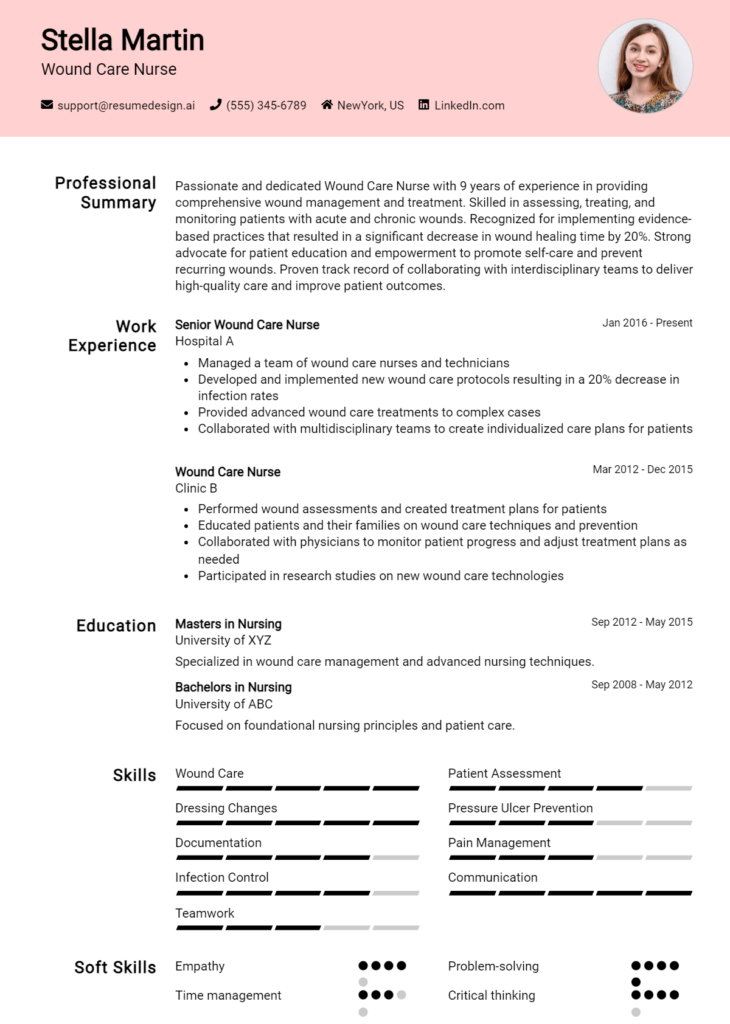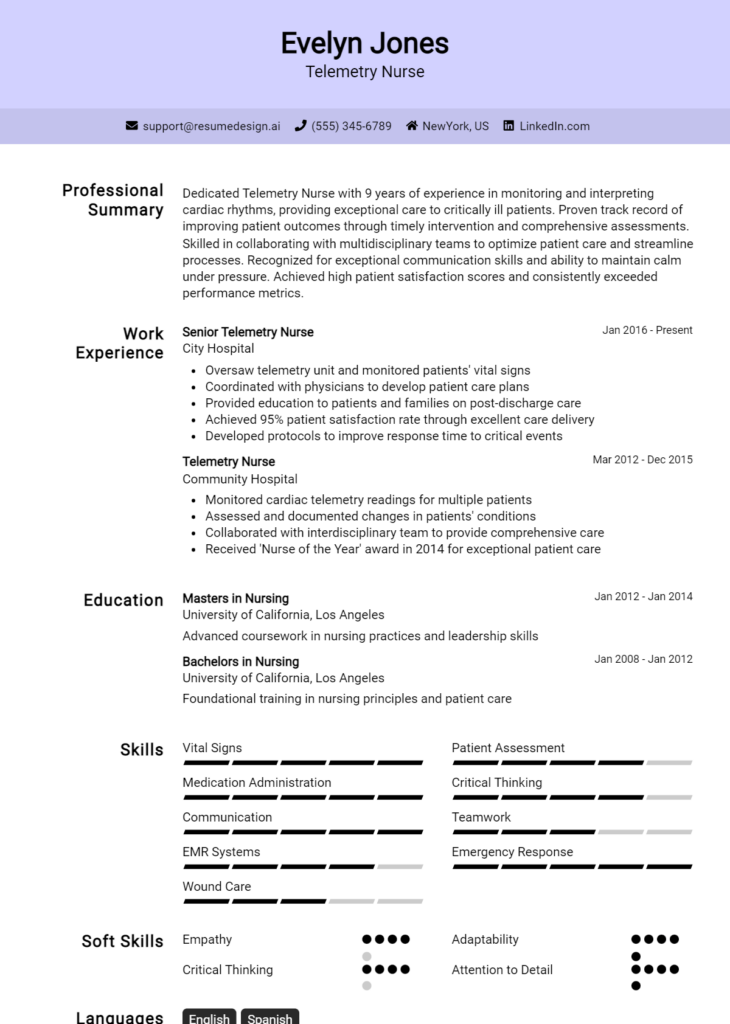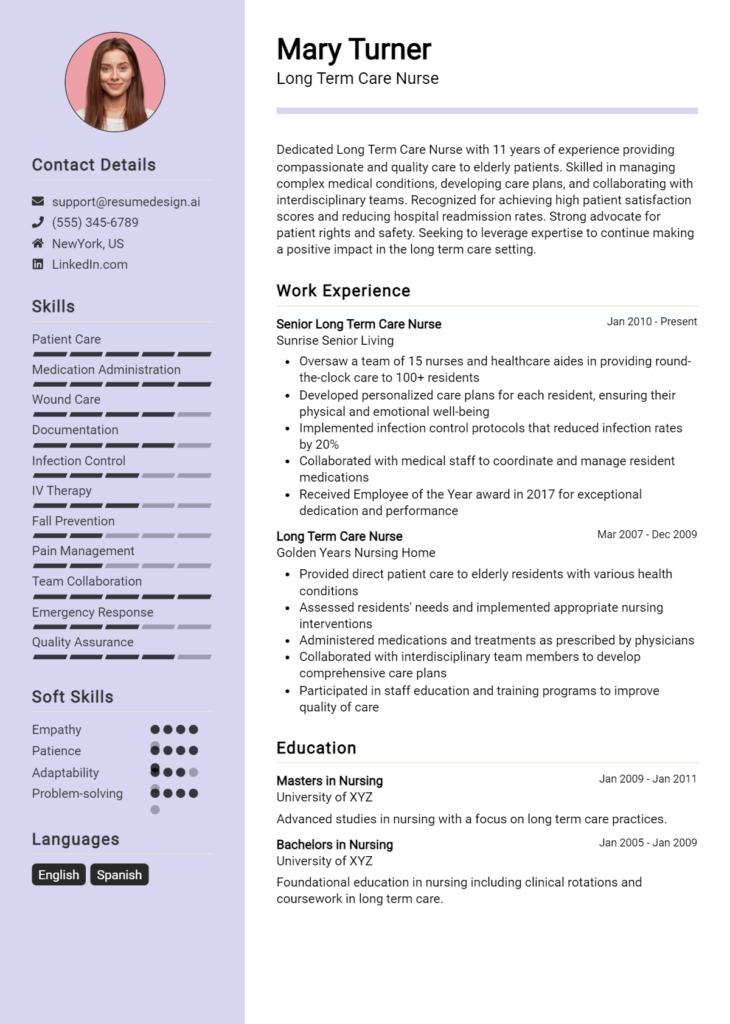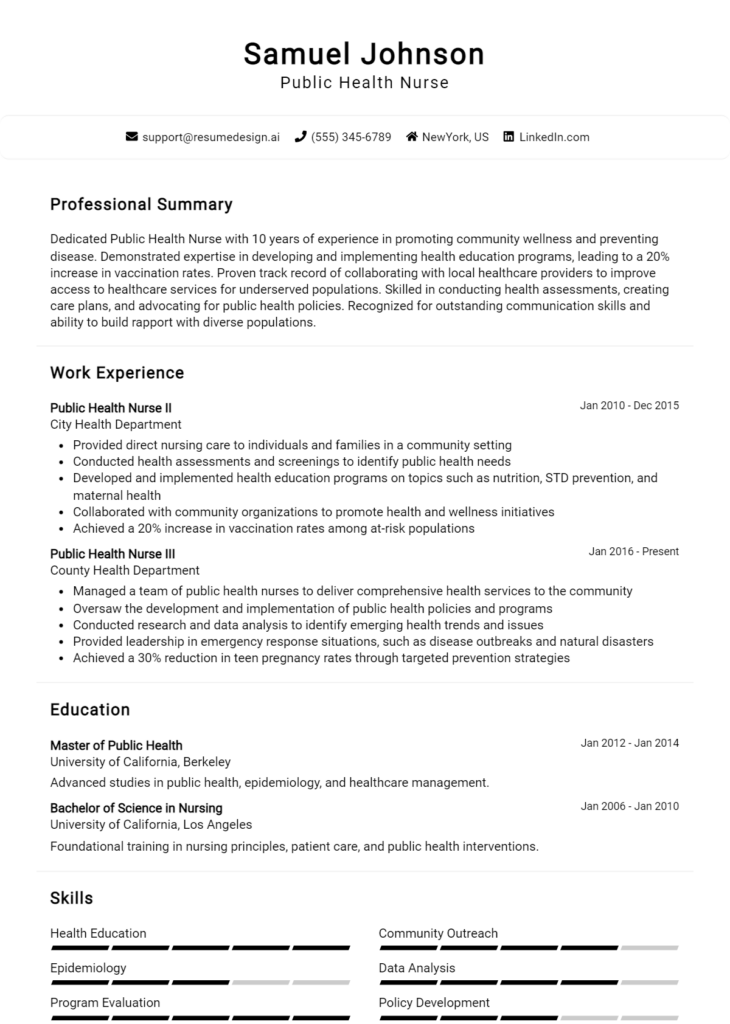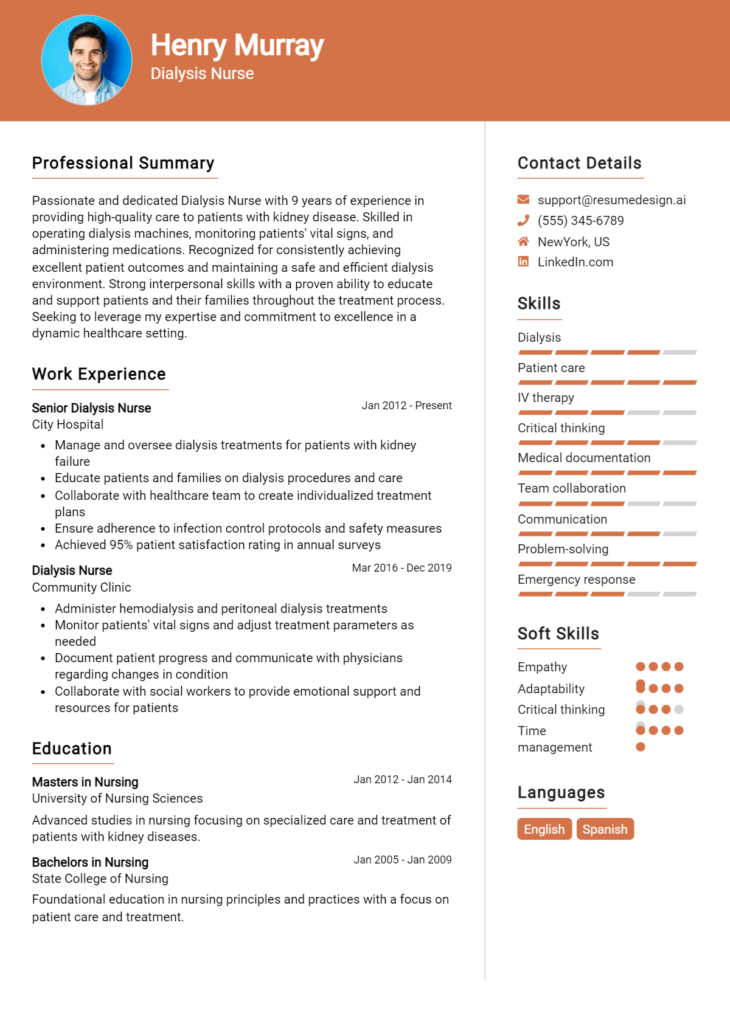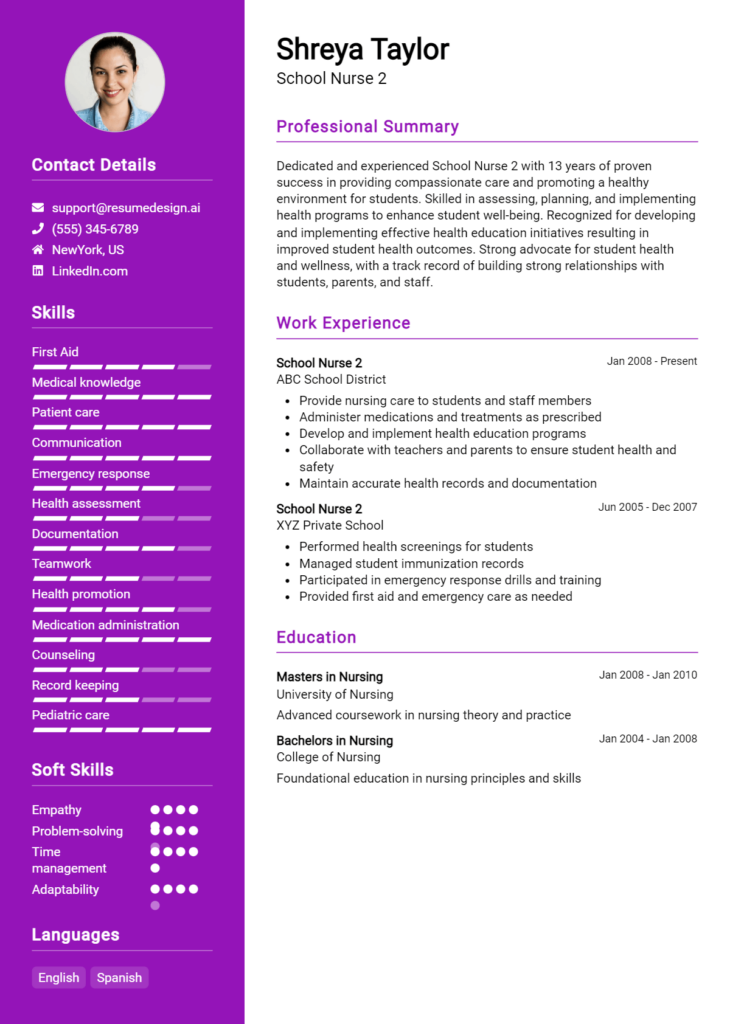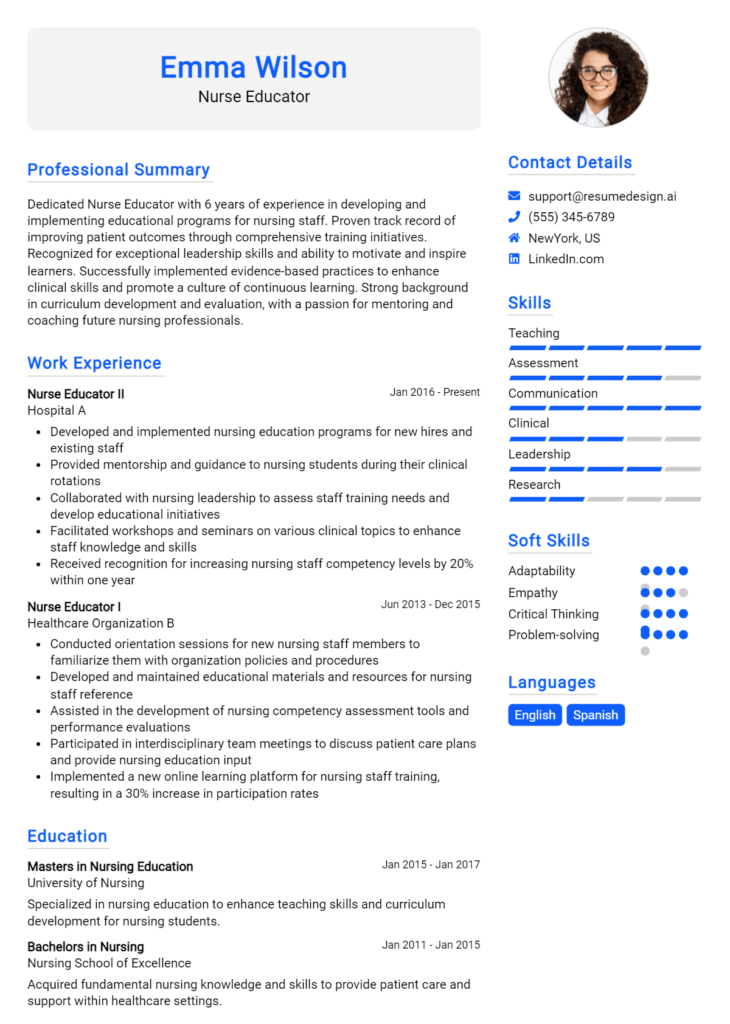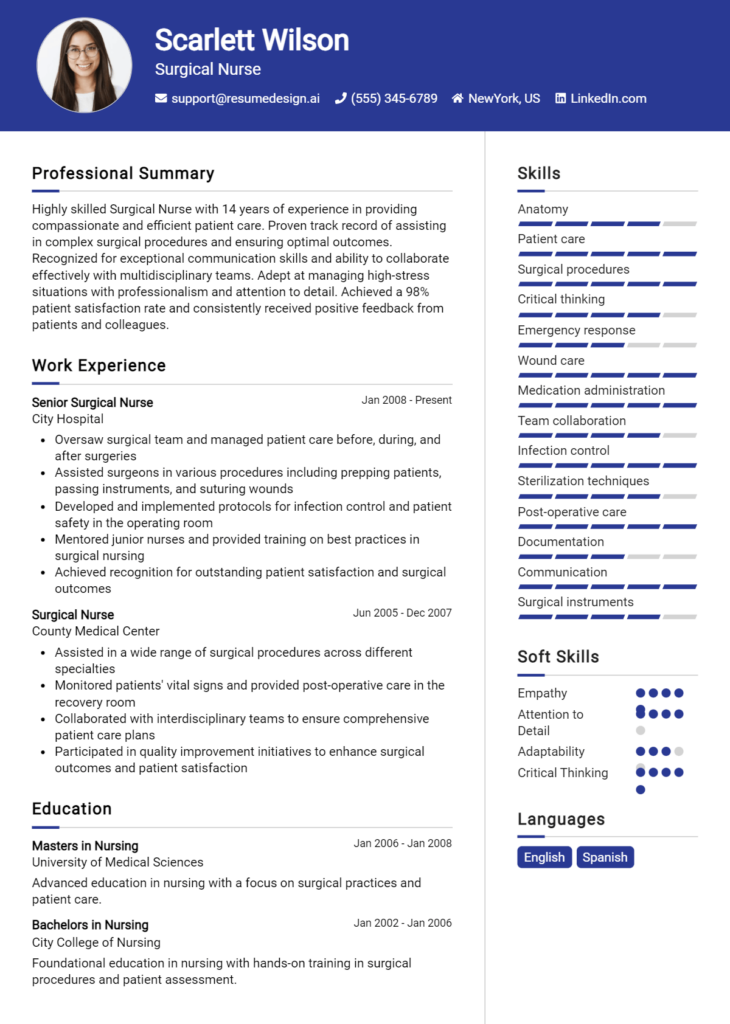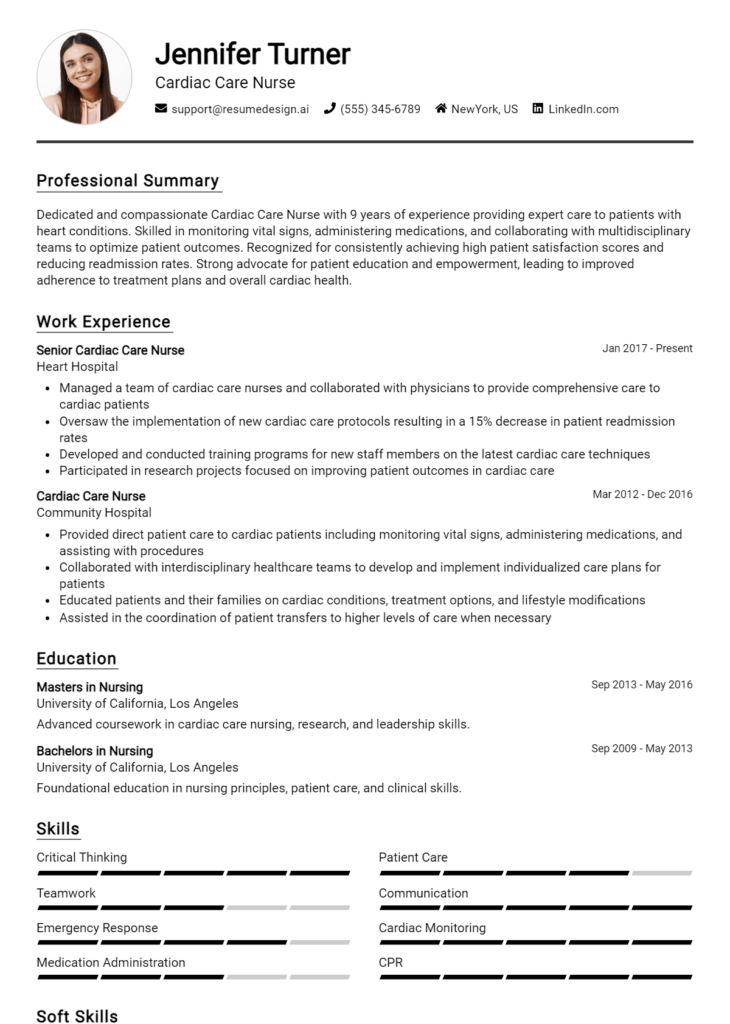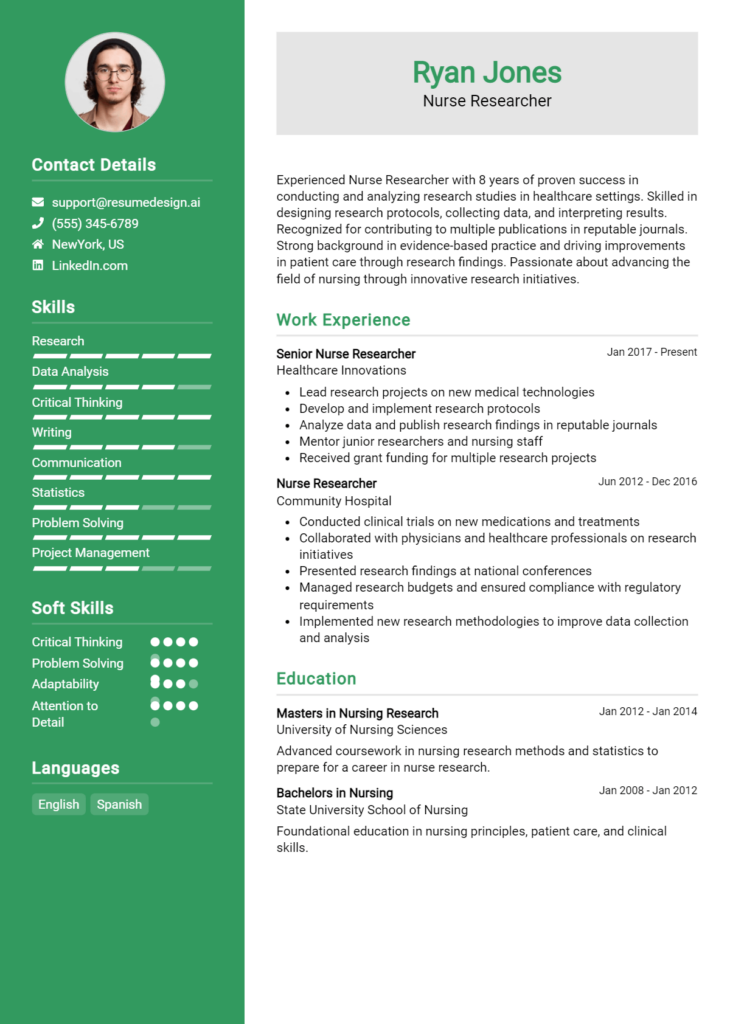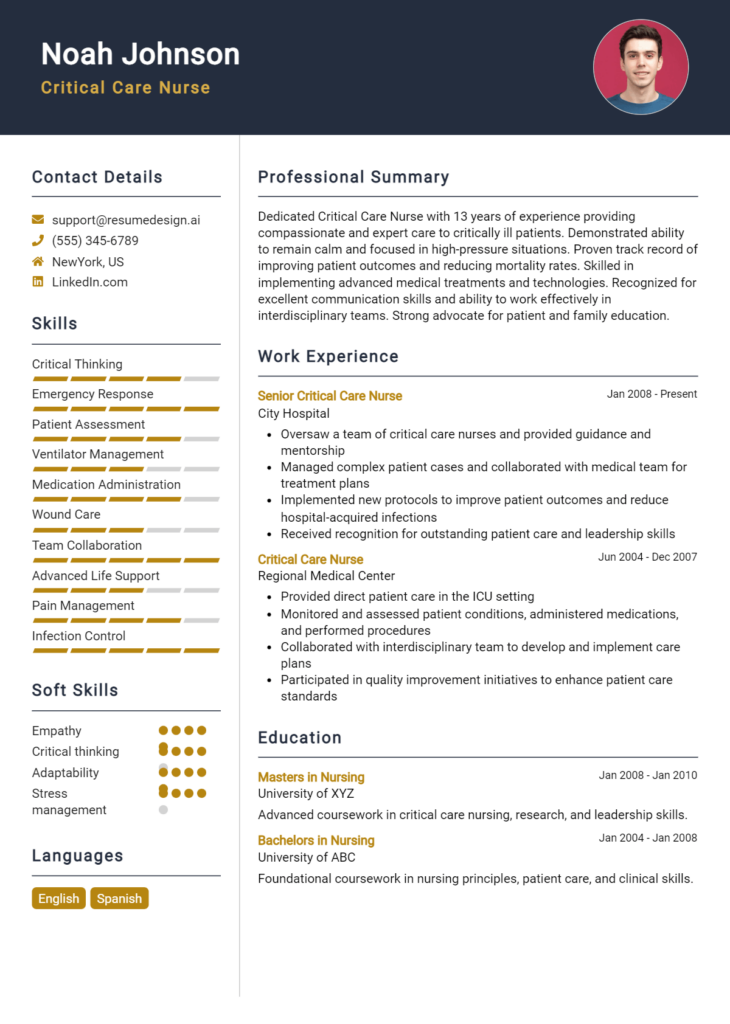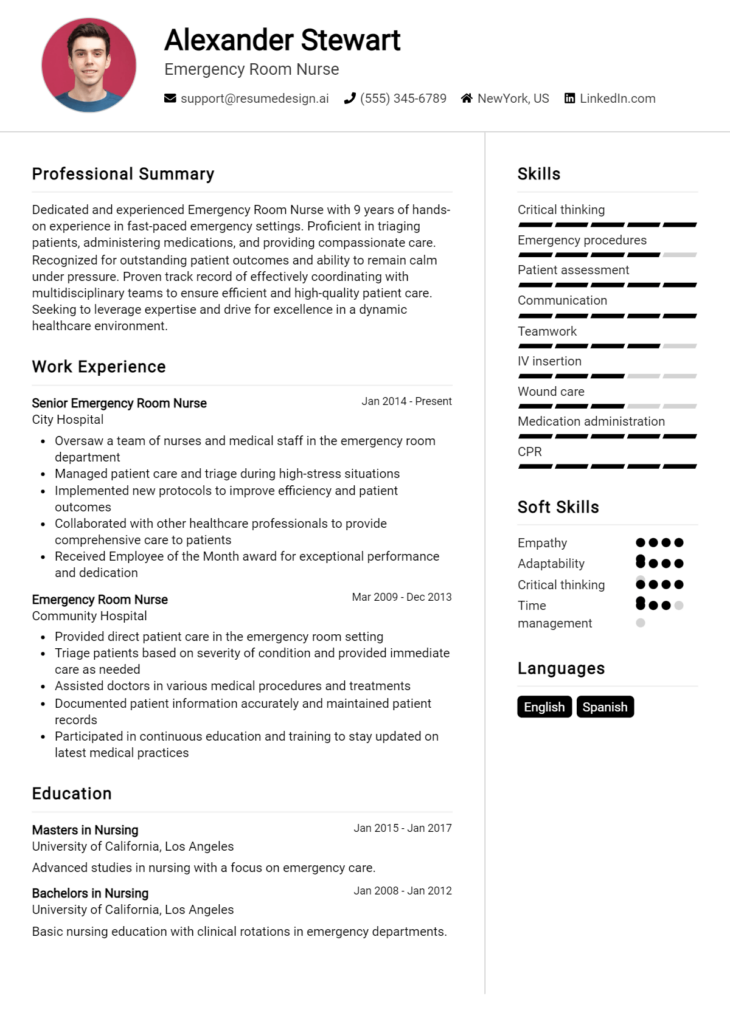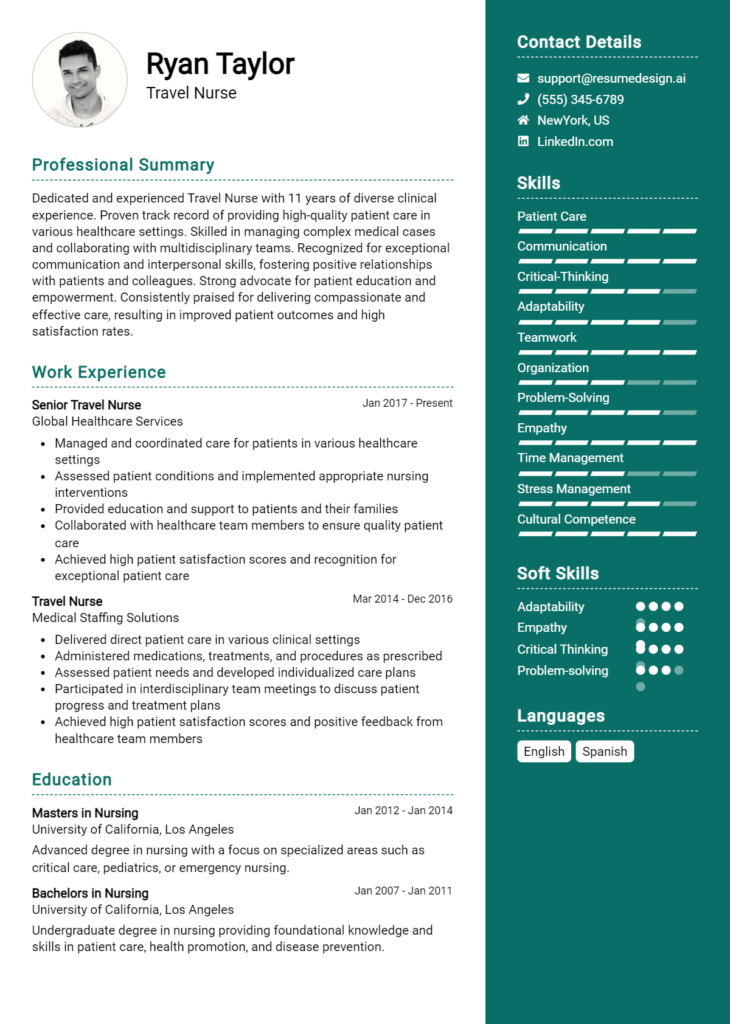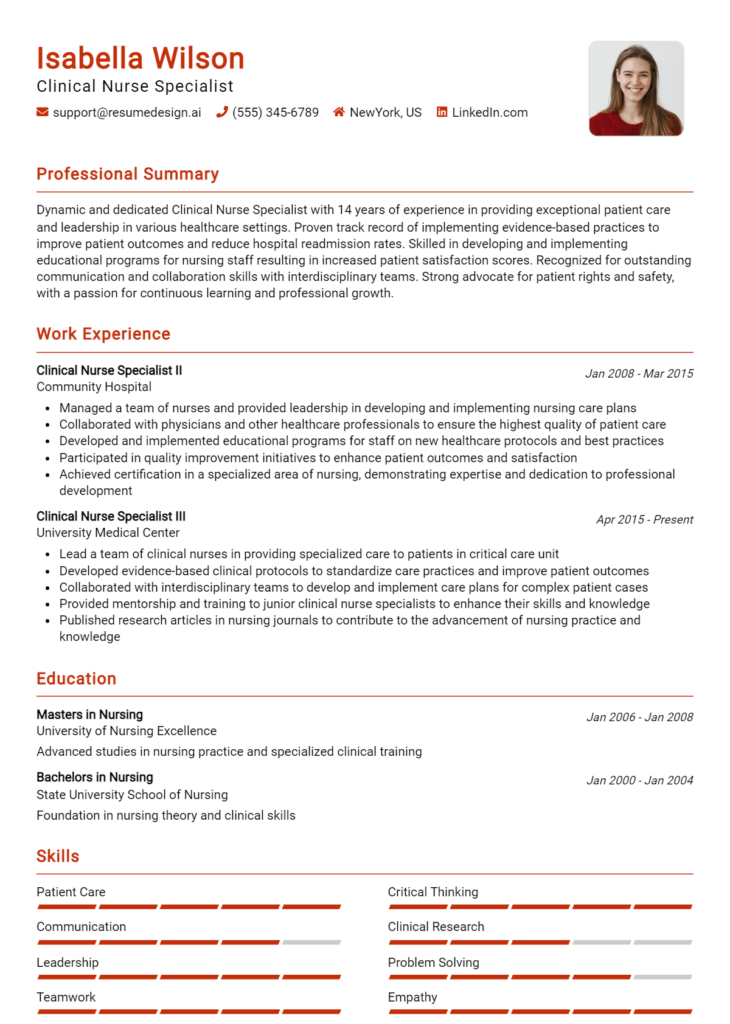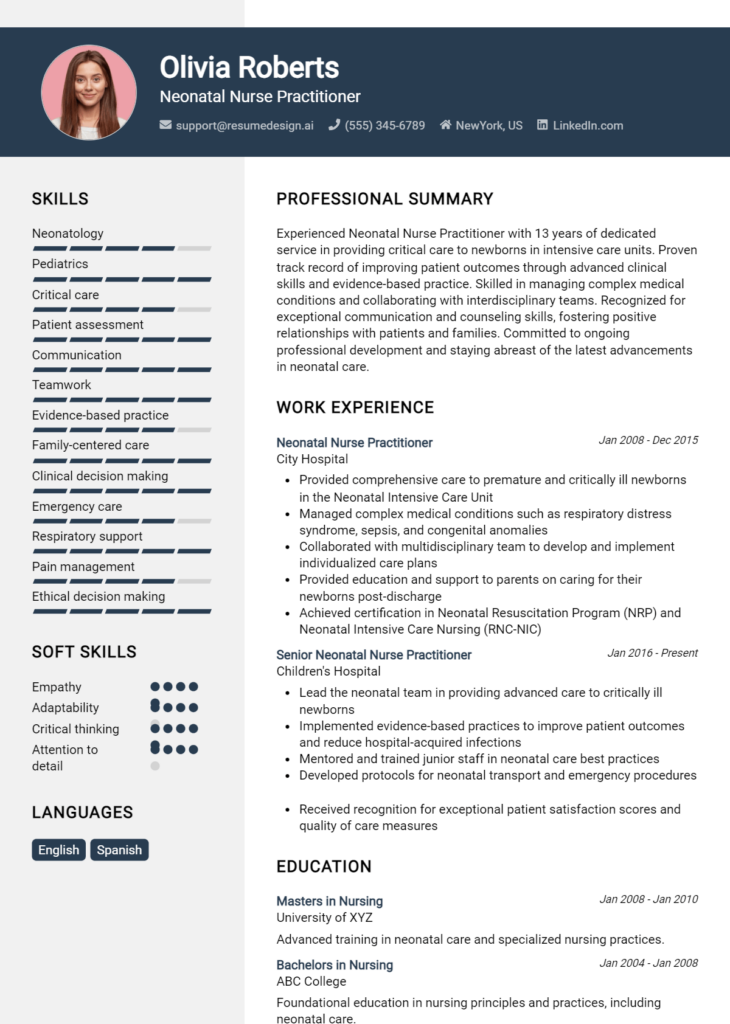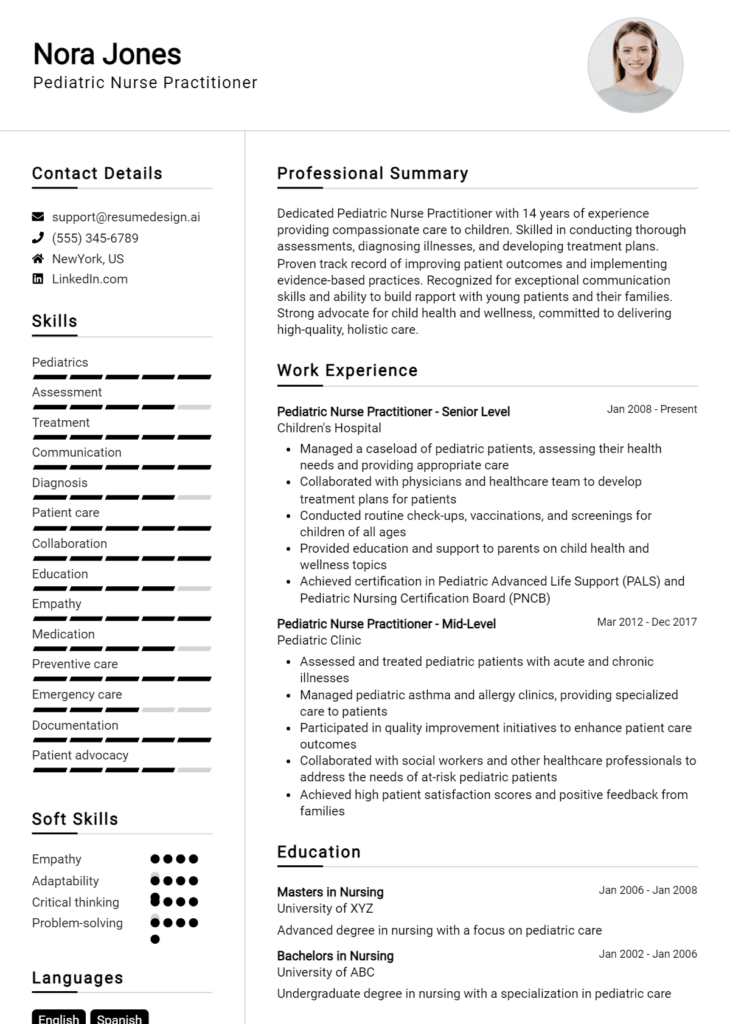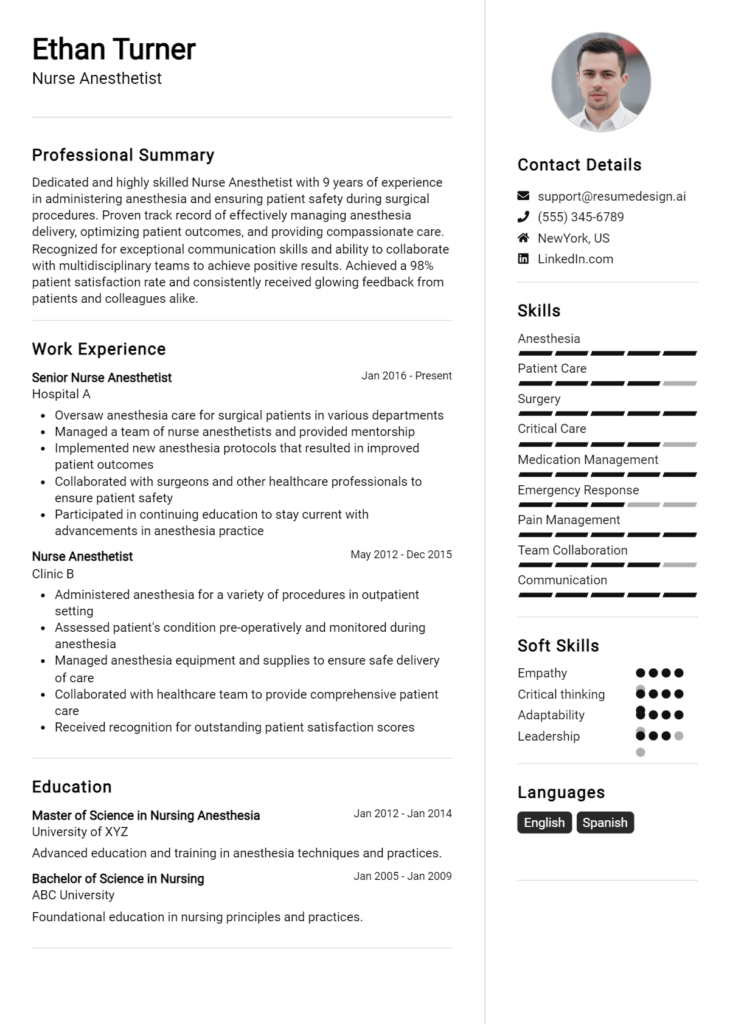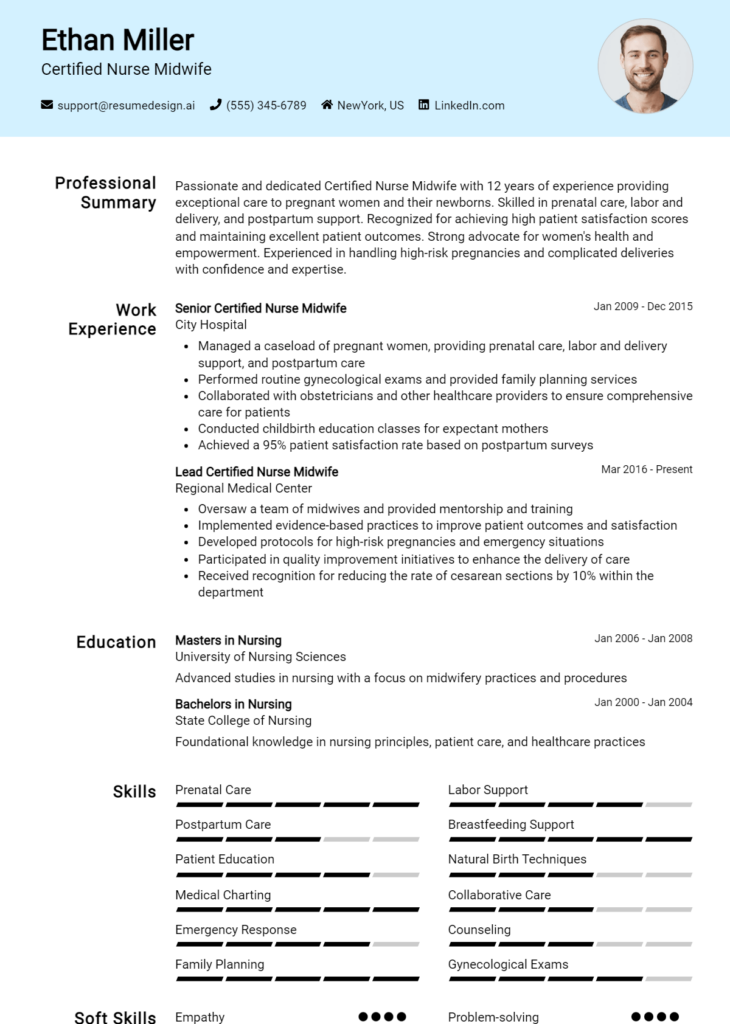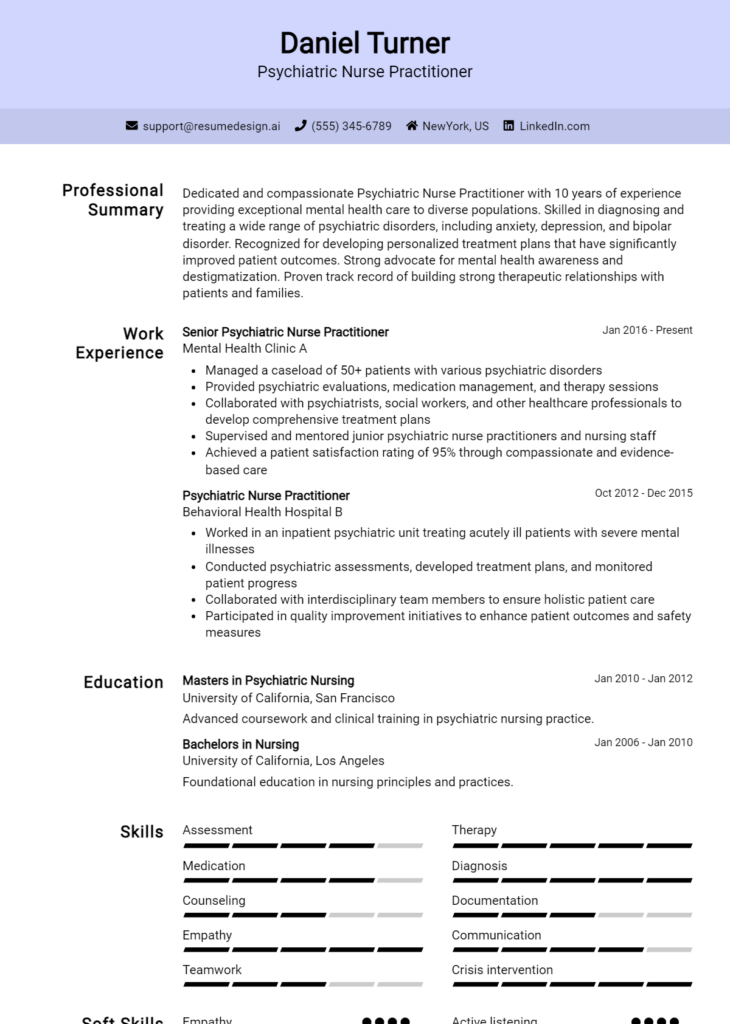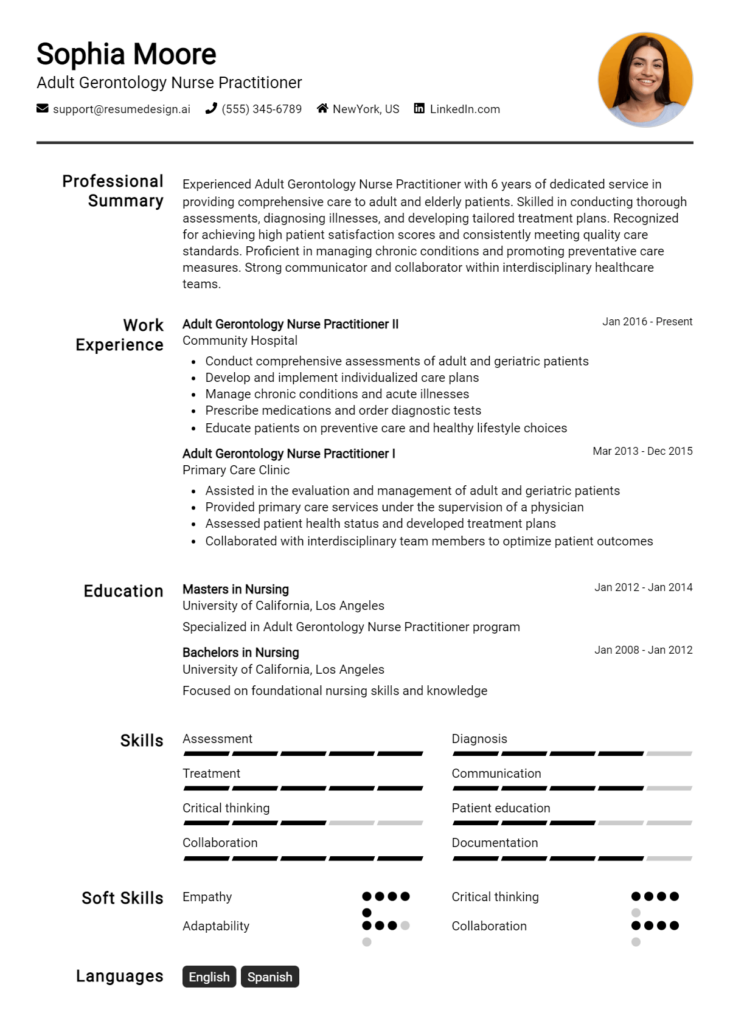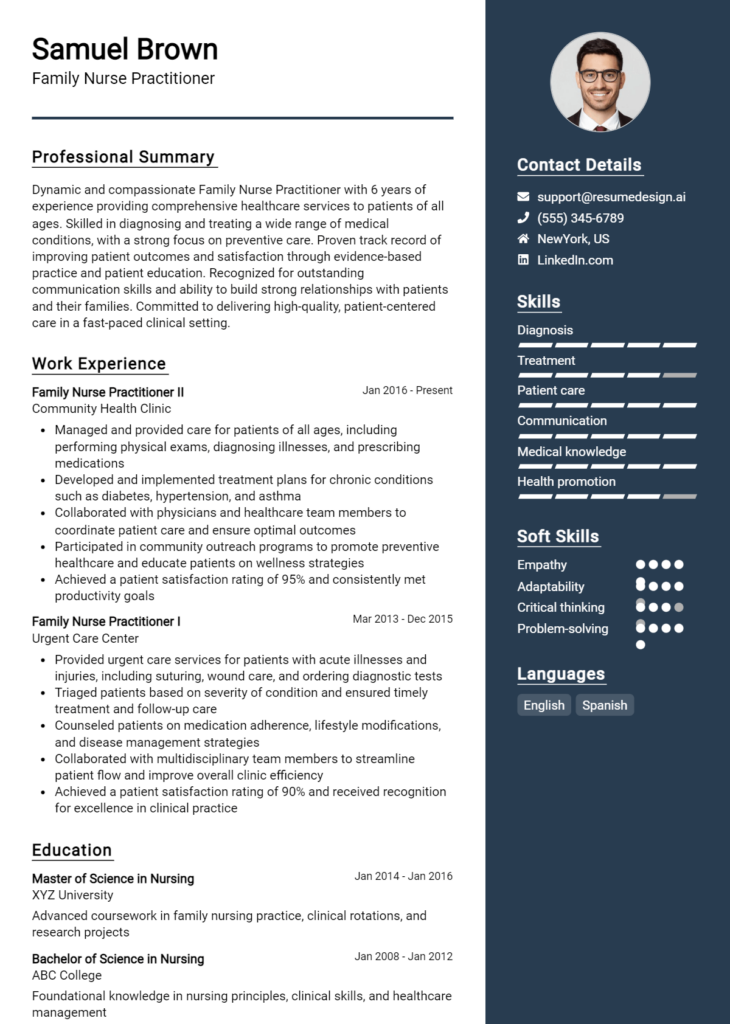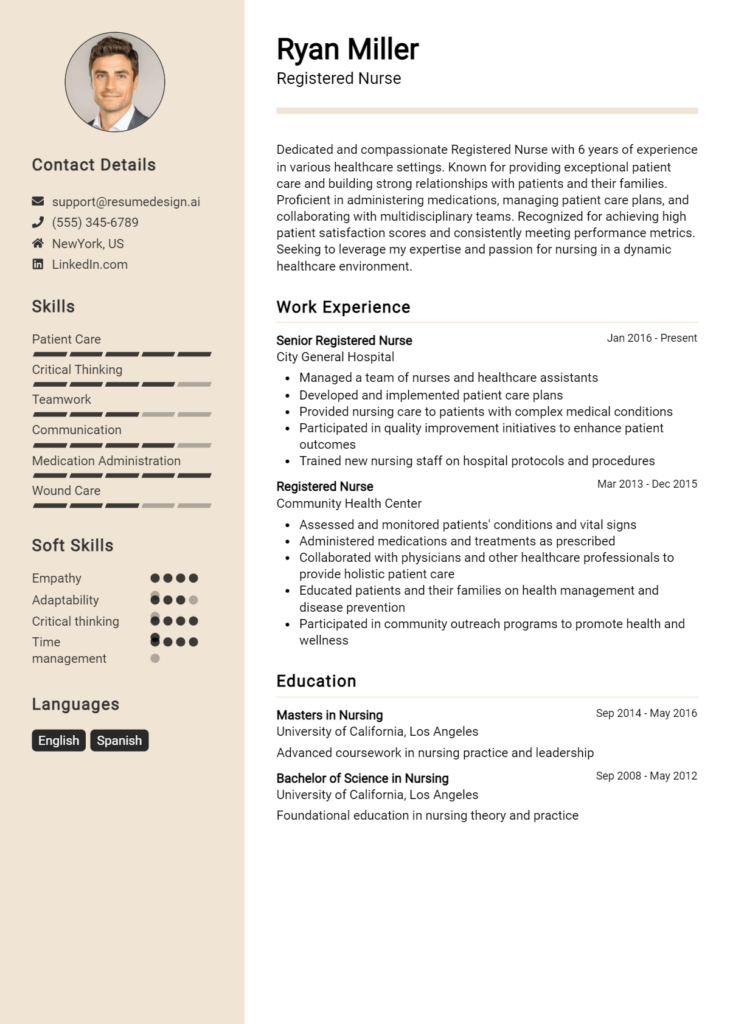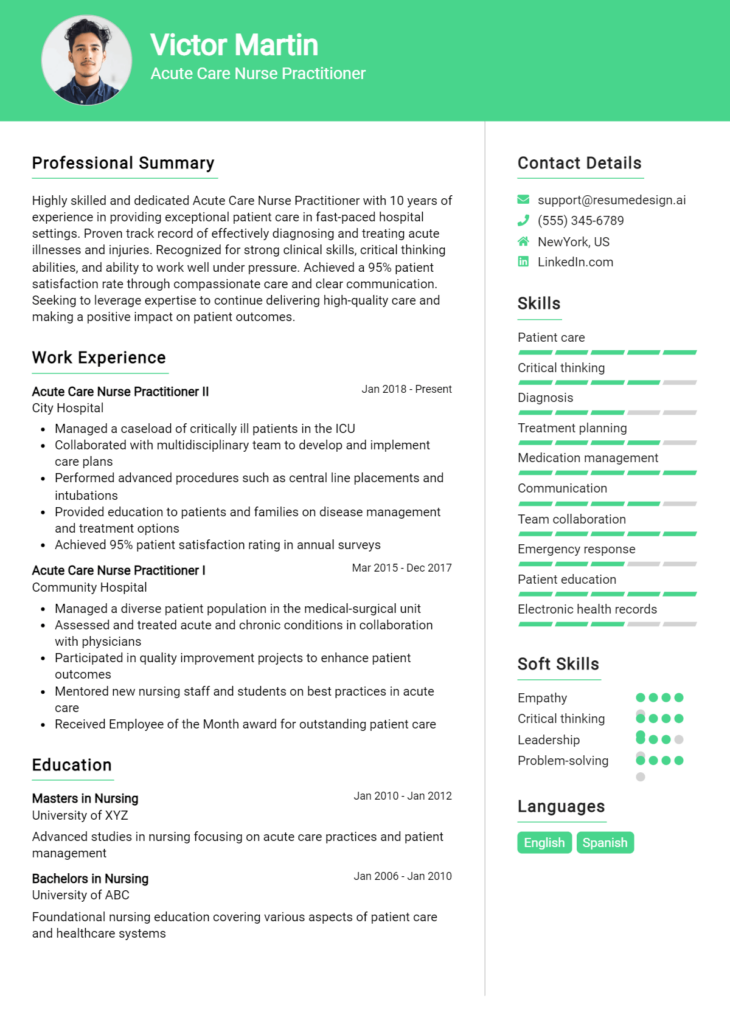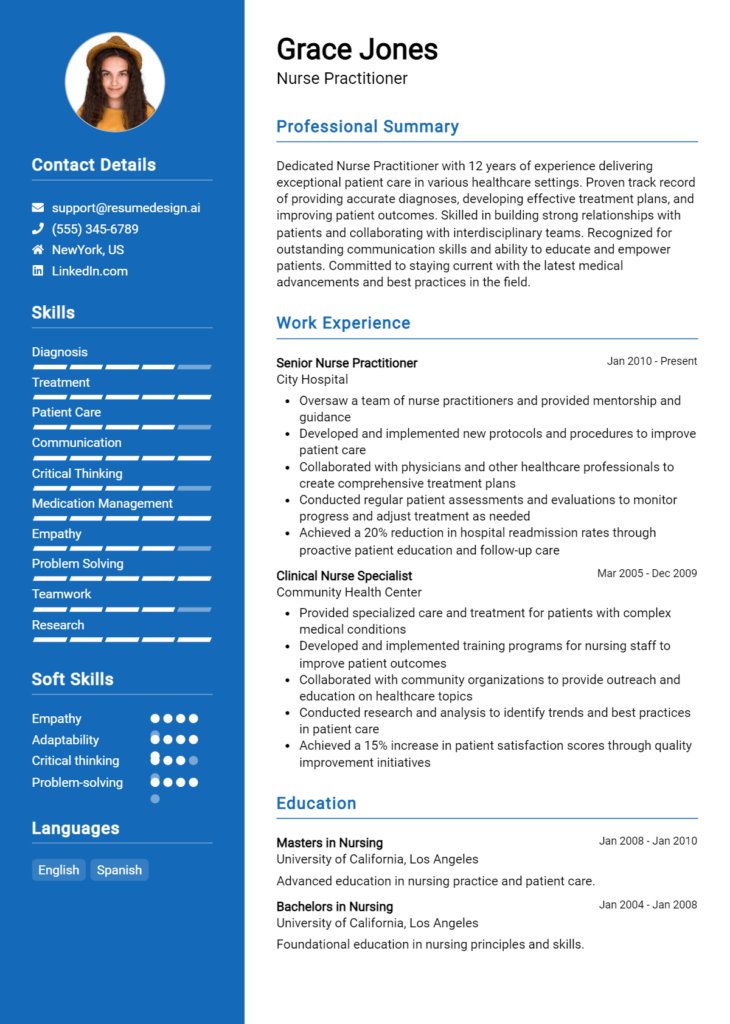Oncology Nurse Core Responsibilities
Oncology nurses play a crucial role in patient care, bridging various departments such as radiology, pharmacy, and social services. They are responsible for administering chemotherapy, monitoring patient progress, and providing emotional support. Essential skills include technical proficiency in cancer treatments, operational efficiency in coordinating care, and strong problem-solving abilities to address complex patient needs. These competencies are vital in achieving the organization’s goals of improving patient outcomes. A well-structured resume should effectively highlight these qualifications to attract potential employers.
Common Responsibilities Listed on Oncology Nurse Resume
- Administer chemotherapy and other cancer treatments.
- Monitor and assess patient responses to treatments.
- Educate patients and families about cancer care and treatment options.
- Collaborate with multidisciplinary teams to coordinate patient care.
- Manage side effects and complications associated with cancer therapies.
- Document patient information and treatment plans accurately.
- Provide emotional support and counseling to patients and families.
- Participate in clinical trials and research initiatives.
- Advocate for patient needs and preferences within the healthcare system.
- Ensure compliance with safety and infection control protocols.
- Assist in the development of care plans tailored to individual patients.
- Stay updated on advancements in oncology nursing practices.
High-Level Resume Tips for Oncology Nurse Professionals
In the competitive field of oncology nursing, a well-crafted resume is essential for making a strong first impression on potential employers. Your resume serves as a crucial marketing tool, showcasing not only your nursing skills but also your specific achievements in oncology care. It needs to effectively reflect your unique qualifications and experiences, capturing the attention of hiring managers in a matter of seconds. This guide will provide practical and actionable resume tips specifically tailored for oncology nurse professionals, helping you to stand out in a crowded job market and demonstrate your commitment to patient care and excellence in oncology nursing.
Top Resume Tips for Oncology Nurse Professionals
- Tailor your resume to each job description by highlighting relevant skills and experiences that align with the specific requirements of the position.
- Showcase your experience in oncology settings, including any specialized training or certifications you have received in cancer care.
- Quantify your achievements, such as the number of patients managed, improvements in patient outcomes, or successful implementation of care protocols.
- Highlight industry-specific skills, such as knowledge of chemotherapy administration, pain management strategies, and patient education techniques.
- Include keywords from the job posting to ensure your resume passes through applicant tracking systems (ATS) and reaches human reviewers.
- Feature any relevant volunteer work or community involvement that demonstrates your commitment to oncology nursing and patient advocacy.
- Utilize a clean and professional format that enhances readability, making it easy for hiring managers to scan your qualifications quickly.
- Incorporate continuing education or professional development courses that keep you updated on the latest oncology nursing practices and guidelines.
- Provide a strong summary statement at the top of your resume that encapsulates your experience, skills, and passion for oncology nursing.
By implementing these tips, you can significantly increase your chances of landing a job in the oncology nursing field. A well-structured and tailored resume will not only highlight your qualifications but also demonstrate your dedication to providing exceptional care to cancer patients, setting you apart from other candidates in this vital healthcare specialty.
Why Resume Headlines & Titles are Important for Oncology Nurse
In the competitive field of oncology nursing, a well-crafted resume headline or title can significantly enhance a candidate's chances of standing out to hiring managers. A strong headline serves as a powerful first impression, effectively summarizing a candidate's key qualifications in a single impactful phrase. It is essential for the headline to be concise, relevant, and specifically tailored to the job being applied for, as it captures the essence of the applicant's professional identity and expertise. By immediately grabbing the attention of hiring managers, a compelling headline can set the tone for the rest of the resume and encourage a deeper review of the candidate's qualifications.
Best Practices for Crafting Resume Headlines for Oncology Nurse
- Keep it concise: Use clear and direct language to convey your message in a few words.
- Make it role-specific: Tailor your headline to reflect the specific oncology nursing position you are applying for.
- Highlight key qualifications: Focus on your most relevant skills and experiences that align with the job description.
- Use impactful language: Choose strong, action-oriented words that demonstrate your expertise and contributions.
- Avoid jargon: Ensure that your headline is easily understood, avoiding overly technical terms that may not resonate with all hiring managers.
- Incorporate certifications: If applicable, mention any relevant certifications that enhance your qualifications as an oncology nurse.
- Reflect your personal brand: Use your headline to convey your unique professional identity and what sets you apart from other candidates.
- Revise for clarity: Review and refine your headline to ensure it communicates your value proposition effectively.
Example Resume Headlines for Oncology Nurse
Strong Resume Headlines
Compassionate Oncology Nurse with 5+ Years of Patient-Centered Care Experience
Certified Oncology Nurse Specializing in Chemotherapy Administration and Patient Education
Dedicated Oncology Nurse Committed to Enhancing Quality of Life for Cancer Patients
Weak Resume Headlines
Nurse Looking for Job
Experienced Healthcare Professional
Strong headlines are effective because they immediately convey specific information about the candidate's expertise and commitment to oncology nursing, making a strong case for their suitability for the position. In contrast, weak headlines fail to impress due to their vagueness and lack of specificity, leaving hiring managers unclear about the candidate's unique qualifications and potential contributions. A compelling headline serves as a strategic tool in the job application process, setting the stage for a successful resume that accurately reflects the candidate's capabilities.
Writing an Exceptional Oncology Nurse Resume Summary
A resume summary is a critical component of an Oncology Nurse's application, serving as a first impression that can greatly influence the hiring manager's decision-making process. A well-crafted summary quickly captures attention by succinctly showcasing the candidate’s key skills, relevant experience, and notable accomplishments in oncology nursing. It acts as a compelling elevator pitch that highlights the candidate's qualifications, demonstrating their ability to provide exceptional patient care in a demanding field. Therefore, a strong summary should be concise, impactful, and specifically tailored to the job for which the candidate is applying.
Best Practices for Writing a Oncology Nurse Resume Summary
- Quantify Achievements: Use specific numbers or outcomes to demonstrate your impact, such as patient recovery rates or the number of patients managed.
- Focus on Relevant Skills: Highlight skills pertinent to oncology nursing, such as chemotherapy administration, patient education, and emotional support.
- Tailor for the Job Description: Customize your summary for each position you apply for, emphasizing the skills and experiences that align with the job requirements.
- Keep it Concise: Aim for 3-5 sentences that effectively convey your qualifications without overwhelming the reader.
- Use Action Verbs: Start sentences with strong action verbs to convey your capabilities and contributions dynamically.
- Showcase Certifications: Mention relevant certifications or training that enhance your qualifications as an oncology nurse.
- Highlight Interpersonal Skills: Emphasize your ability to connect with patients and families, as strong communication is crucial in oncology nursing.
- Include Professional Goals: Briefly mention your career aspirations, especially if they align with the prospective employer’s mission or values.
Example Oncology Nurse Resume Summaries
Strong Resume Summaries
Compassionate Oncology Nurse with over 7 years of experience in providing high-quality patient care in inpatient and outpatient settings. Successfully managed a caseload of 20+ patients daily, achieving a 95% patient satisfaction score through effective communication and emotional support.
Dedicated Oncology Nurse with a proven track record in chemotherapy administration and patient education. Enhanced patient compliance by 30% through the development of personalized care plans and educational resources, resulting in improved treatment outcomes.
Results-driven Oncology Nurse with expertise in pain management and symptom control. Led a quality improvement initiative that reduced medication errors by 40%, ensuring safe and effective patient care in a high-volume oncology unit.
Weak Resume Summaries
Experienced nurse looking for a new opportunity in oncology. I have worked with patients and am familiar with cancer treatments.
Nurse with some experience in oncology. I am passionate about helping patients and learning more about cancer care.
The strong resume summaries are considered effective because they provide specific examples of accomplishments and quantify results, showcasing the candidate's skills in a way that is directly relevant to the role of an Oncology Nurse. They highlight unique contributions and demonstrate a commitment to patient care. In contrast, the weak summaries lack detail and specificity, making them too generic and failing to convey the candidate's true value or expertise in the field of oncology nursing.
Work Experience Section for Oncology Nurse Resume
The work experience section of an Oncology Nurse resume is crucial as it serves as a platform to showcase the candidate's technical skills, leadership capabilities, and commitment to delivering high-quality patient care. This section not only highlights the nurse's hands-on experience in oncology settings but also demonstrates their ability to manage teams and coordinate patient treatment plans effectively. By quantifying achievements and aligning their experience with industry standards, candidates can provide compelling evidence of their qualifications and readiness for the role.
Best Practices for Oncology Nurse Work Experience
- Clearly outline your job titles, responsibilities, and dates of employment.
- Use action verbs to describe your achievements and responsibilities.
- Quantify your accomplishments, such as the number of patients cared for or success rates in treatment plans.
- Highlight technical expertise, including specific oncology treatments or technologies used.
- Emphasize collaboration with multidisciplinary teams and communication skills.
- Tailor your experience to align with the job description and industry standards.
- Include any relevant certifications or specialized training in oncology nursing.
- Reflect on your leadership roles or initiatives that improved patient care or team performance.
Example Work Experiences for Oncology Nurse
Strong Experiences
- Managed a team of 6 nurses in delivering chemotherapy treatments, achieving a 95% patient satisfaction rate over 3 years.
- Implemented a new patient tracking system, reducing appointment wait times by 30%, enhancing overall clinic efficiency.
- Developed and led educational workshops for nursing staff on advanced oncology care techniques, improving team performance by 25%.
- Collaborated with oncologists and pharmacists to design individualized care plans for over 100 patients, resulting in a 20% increase in positive treatment outcomes.
Weak Experiences
- Helped patients with their treatments and monitored their progress.
- Worked as part of a team to provide care in an oncology setting.
- Assisted in the administration of medication and recorded patient information.
- Participated in meetings to discuss patient care and team management.
The strong experiences listed above are considered effective because they provide specific, quantifiable outcomes and demonstrate leadership and collaboration within a healthcare team. They articulate the nurse's contributions to patient care and operational efficiency, showcasing a clear impact on both patient outcomes and team dynamics. In contrast, the weak experiences lack detail and fail to convey measurable results or the candidate's direct impact, making them less compelling to potential employers.
Education and Certifications Section for Oncology Nurse Resume
The education and certifications section of an Oncology Nurse resume serves as a crucial component that underscores the candidate's academic achievements, industry-specific certifications, and ongoing commitment to professional development. This section not only highlights the foundational knowledge acquired through formal education but also showcases relevant certifications and specialized training that are essential for providing high-quality patient care in oncology. By including pertinent coursework and credentials, candidates can significantly enhance their credibility and demonstrate their alignment with the specific demands of the oncology nursing role, ultimately making them a more attractive prospect for potential employers.
Best Practices for Oncology Nurse Education and Certifications
- Include only relevant degrees and certifications that pertain to oncology nursing.
- Highlight advanced certifications, such as Oncology Certified Nurse (OCN) or Chemotherapy Immunotherapy Certification.
- Provide detailed information about coursework that directly relates to oncology, such as cancer biology or palliative care.
- Order your education and certifications chronologically, starting with the most recent qualifications.
- Use specific terminology and keywords that align with job descriptions in oncology nursing.
- Include any continuing education courses that reflect your commitment to staying current in the field.
- Showcase specialized training, such as advanced life support or pain management techniques.
- Consider adding honors or awards that demonstrate excellence in your academic or professional journey.
Example Education and Certifications for Oncology Nurse
Strong Examples
- Bachelor of Science in Nursing (BSN), University of Health Sciences, 2020
- Oncology Certified Nurse (OCN), Oncology Nursing Certification Corporation, 2021
- Advanced Chemotherapy and Immunotherapy Certificate, National Cancer Institute, 2022
- Coursework in Palliative Care and Pain Management, University of Health Sciences, 2019
Weak Examples
- Associate Degree in General Studies, Community College, 2015
- Basic Life Support (BLS) Certification, expired 2020
- High School Diploma, Anytown High School, 2010
- Certification in First Aid, not specific to healthcare, 2018
The examples listed are categorized as strong or weak based on their relevance and alignment with the oncology nursing role. Strong examples reflect a clear focus on nursing education and specialized training pertinent to oncology, demonstrating the candidate’s preparedness for the position. In contrast, weak examples lack direct relevance to oncology nursing and may include outdated or generalized qualifications that do not enhance the candidate's appeal for this specialized field.
Top Skills & Keywords for Oncology Nurse Resume
As an Oncology Nurse, possessing a diverse set of skills is imperative not only for providing exceptional patient care but also for creating a compelling resume that can capture the attention of hiring managers. The specialized nature of oncology nursing requires a unique blend of technical competencies and interpersonal abilities to navigate the complexities of cancer care. Highlighting the right skills on your resume not only showcases your qualifications but also reflects your dedication to the field. For those aspiring to excel in this challenging yet rewarding role, a strong emphasis on both hard and soft skills is essential.
Top Hard & Soft Skills for Oncology Nurse
Soft Skills
- Empathy
- Communication
- Team Collaboration
- Emotional Resilience
- Critical Thinking
- Problem Solving
- Time Management
- Adaptability
- Patient Advocacy
- Attention to Detail
- Active Listening
- Stress Management
- Compassion
- Cultural Competence
- Professionalism
- Conflict Resolution
- Interpersonal Skills
- Leadership
Hard Skills
- Chemotherapy Administration
- Pain Management
- Patient Assessment
- IV Therapy
- Knowledge of Oncology Protocols
- Electronic Health Records (EHR) Management
- Clinical Research and Trials
- Symptom Management
- Patient Education
- Oncology Pharmacology
- Wound Care
- Blood Transfusion Procedures
- Palliative Care Techniques
- Understanding of Diagnostic Procedures
- Advanced Cardiac Life Support (ACLS) Certification
- Basic Life Support (BLS) Certification
- Lab Result Interpretation
- Infection Control Practices
For a comprehensive guide on how to effectively integrate these skills with your work experience, be sure to explore the resources available to refine your resume and enhance your chances of securing your desired position in oncology nursing.
Stand Out with a Winning Oncology Nurse Cover Letter
Dear Hiring Manager,
I am writing to express my interest in the Oncology Nurse position at [Hospital/Clinic Name], as advertised on [Job Board/Website]. With a Bachelor of Science in Nursing and over [X years] of experience in oncology care, I am enthusiastic about the opportunity to contribute to your team. My background includes extensive experience providing compassionate patient care, administering chemotherapy, and supporting patients and their families during challenging times. I am particularly drawn to [Hospital/Clinic Name] due to its commitment to innovative treatment and patient-centered care, which aligns with my own professional values.
In my previous role at [Previous Employer], I developed a comprehensive understanding of the complexities involved in oncology nursing. I actively collaborated with multidisciplinary teams to create individualized care plans, ensuring that all aspects of a patient's physical, emotional, and psychological needs were addressed. My hands-on experience in managing treatment side effects and conducting patient education sessions has equipped me with the skills needed to provide empathetic and effective care. Additionally, I have been involved in quality improvement initiatives that focused on enhancing patient outcomes and streamlining care processes.
I am excited about the prospect of joining [Hospital/Clinic Name] and contributing to your mission of providing exceptional oncology care. I am confident that my clinical expertise, along with my passion for patient advocacy, will enable me to make a meaningful impact on the lives of those battling cancer. Thank you for considering my application. I look forward to the opportunity to discuss how my skills and experiences align with the needs of your team.
Sincerely,
[Your Name]
[Your Contact Information]
Common Mistakes to Avoid in a Oncology Nurse Resume
When crafting a resume for an oncology nurse position, it's crucial to present your qualifications and experience effectively. However, many candidates fall into common pitfalls that can undermine their chances of landing an interview. Avoiding these mistakes can help you create a compelling and professional resume that stands out to employers in the competitive field of oncology nursing.
Neglecting Tailoring to the Job Description
Failing to customize your resume for the specific position can lead to a generic application that doesn't highlight your most relevant skills and experiences.Overloading with Jargon
While medical terminology is important, using too much jargon can confuse hiring managers. Strive for clarity to ensure your qualifications are easily understood.Omitting Key Certifications
Not listing relevant certifications, such as Oncology Certified Nurse (OCN) or Basic Life Support (BLS), can make you seem less qualified. Always include critical certifications that demonstrate your expertise.Inadequate Experience Descriptions
Simply listing job titles without elaborating on responsibilities and accomplishments can diminish the impact of your work history. Use bullet points to detail your achievements and specific duties.Ignoring Soft Skills
Focusing solely on technical skills and neglecting to mention soft skills, such as empathy and communication, can make your application one-dimensional. Highlighting these traits is vital in oncology nursing.Poor Formatting and Organization
A cluttered or disorganized resume can distract from your qualifications. Use clear headings, consistent formatting, and bullet points to enhance readability.Including Irrelevant Information
Adding personal details or unrelated job experiences can dilute the focus of your resume. Stick to relevant nursing experience and skills to keep the attention on your oncology qualifications.Failing to Proofread
Spelling and grammatical errors can create a negative impression. Always proofread your resume multiple times or have someone else review it to ensure professionalism.
Conclusion
As an Oncology Nurse, your role is critical in providing compassionate care to patients battling cancer. Throughout this article, we have explored the essential skills and qualifications that define a successful Oncology Nurse, including the importance of clinical expertise, emotional support, and effective communication with patients and their families. We also discussed the significance of staying current with advancements in cancer treatment and the necessity of advocating for patients' needs within the healthcare system.
To ensure you stand out in this rewarding yet competitive field, it's essential to have a polished resume that highlights your unique qualifications and experiences. We encourage you to take the time to review and update your Oncology Nurse resume, ensuring it reflects your skills and achievements accurately.
To assist you in this process, a variety of resources are available. Explore resume templates to find a design that suits your professional style. Utilize the resume builder for a user-friendly way to create a standout resume. If you’re looking for inspiration, check out resume examples that showcase successful Oncology Nurse profiles. Additionally, don't overlook the impact of a well-crafted introduction; our cover letter templates can help you make a strong first impression.
By leveraging these tools, you can enhance your resume and position yourself as a compelling candidate in the field of oncology nursing. Take action today to ensure your resume effectively communicates your dedication and expertise.

